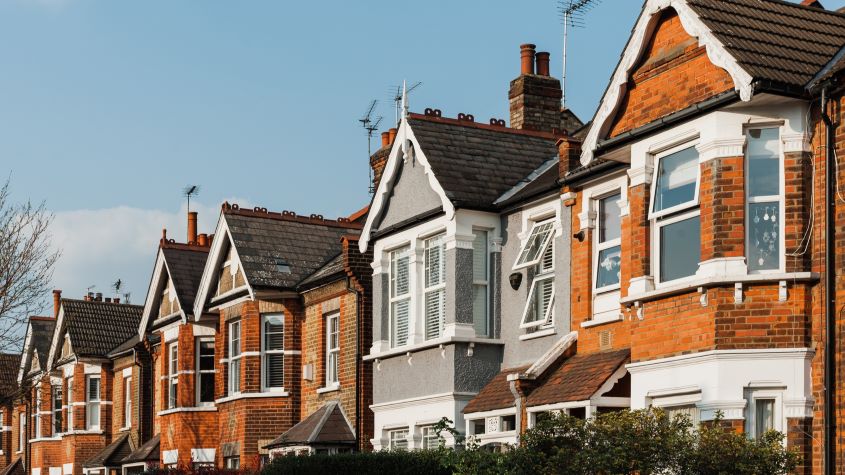Halifax: House prices rise for the third month in a row
Despite higher interest rates, Halifax says house prices are still rising in some parts of the country


Get the latest financial news, insights and expert analysis from our award-winning MoneyWeek team, to help you understand what really matters when it comes to your finances.
You are now subscribed
Your newsletter sign-up was successful
Want to add more newsletters?

Twice daily
MoneyWeek
Get the latest financial news, insights and expert analysis from our award-winning MoneyWeek team, to help you understand what really matters when it comes to your finances.

Four times a week
Look After My Bills
Sign up to our free money-saving newsletter, filled with the latest news and expert advice to help you find the best tips and deals for managing your bills. Start saving today!
Average house prices increased by 0.8% in March according to Halifax’s latest House Price Index.
While house prices rose in all UK nations and regions last month, the annual rate of growth continued to slow in most areas, down to 1.6% from 2.1% for the three previous months.
According to the lender, the typical UK property now costs £287,880, compared to £285,660 in February.
MoneyWeek
Subscribe to MoneyWeek today and get your first six magazine issues absolutely FREE

Sign up to Money Morning
Don't miss the latest investment and personal finances news, market analysis, plus money-saving tips with our free twice-daily newsletter
Don't miss the latest investment and personal finances news, market analysis, plus money-saving tips with our free twice-daily newsletter
But for those looking to either sell or buy a house, the broad picture remains unclear.
Kim Kinnaird, director at Halifax Mortgages, notes while the market is still recovering from the mini-budget, the latest figures suggest some stability has returned to the housing market in the first few months of 2023.
“This has been characterised by a partial recovery in activity and transactions, especially when compared to the significant drops seen at the end of last year, with the latest Bank of England data showing mortgage approvals rising for the first time in six months,” she said.
“While rates remain much higher than the average of the last decade, across the industry a typical five-year fixed rate deal (75% LTV) is down by more than 100 basis points over the last few months,” Kinnaird added.
An expected fall in inflation over the coming months could further aid the recovery, but mortgage costs are unlikely to get “significantly cheaper in the short term” while the housing market will the new norms of higher borrowing costs and lower demand.
“Therefore, we still expect to see a continued slowdown through this year,” she said.
How have house prices changed per region?
The average house price edged up in all the UK nations and regions during March according to Halifax’s data, although growth slowed in most areas (with the exceptions of Greater London and the North East).
Northern Ireland continues to report the strongest annual growth in house prices of 4.9% (average house price of £186,459), followed by the West Midlands (3.8%, average property price of £248,308).
In Wales, the rate of annual property price inflation has slowed to 1.0% (average house price of £213,959).
Similarly in Scotland, the annual rate of growth fell to 2.3% (average property price of £199,853).
Average house prices in London are up very slightly on this time last year (0.1%) with the typical property now costing £537,250.
What will happen to house prices this year?
A separate analysis by Rightmove showed house prices rose 0.8% in March, largely on the back of a jump in the cost of large homes.
Meanwhile, Nationwide found house prices fell by 3.1% on a year-on-year basis in March, the largest annual decline since July 2009, triggering fears that the housing market will face a significant downturn for the remainder of the year.
These conflicting assessments are symptomatic of a “hiccupping market that is adjusting to a come down” from the rapid pace of house price growth over the past few years, said Myron Jobson, senior personal finance analyst at interactive investor.
"The reality is there is a collection of micro-markets at play. There are still regions where gazumping and bidding wars are rife, and the opposite is true in other parts of the nation. Estate agents have reported that a lack of supply in larger properties have kept prices inflated, as the race for space theme continues to play out,” he said.
A slump in mortgage rates, alongside a strong labour market, have helped to keep prices elevated, Jobson explained.
“But there is mounting evidence that the housing market is seemingly in a pendulum moment — swinging back in a buyer’s market direction,” he added.
Sarah Coles, head of personal finance at Hargreaves Lansdown also acknowledged the mixed picture being presented by housing data this year.
“As Zoopla highlighted earlier this week, demand is still down 43% in a year and sales have fallen 16%. Sellers are still having to cut prices by an average of 4% - or £14,000 - in order to sell, and the annual growth of asking prices continues to fall,” she said.
For many, affordability is being pushed “to the limits”, meaning we are likely to see weakness “persist” in the market. “We’re unlikely to have seen the last of the price falls,” she added.
And with the start of a new tax year, the drain on people’s buying power is “far from over,” said Alice Haine, personal finance analyst at Bestinvest.
“While the worst of the cost-of-living crisis appears to be behind us, the outlook for house prices is uncertain as households still have a number of personal finance challenges to contend with that may affect their buying power,” she said.
Get the latest financial news, insights and expert analysis from our award-winning MoneyWeek team, to help you understand what really matters when it comes to your finances.
Tom is a journalist and writer with an interest in sustainability, economic policy and pensions, looking into how personal finances can be used to make a positive impact.
He graduated from Goldsmiths, University of London, with a BA in journalism before moving to a financial content agency.
His work has appeared in titles Investment Week and Money Marketing, as well as social media copy for Reuters and Bloomberg in addition to corporate content for financial giants including Mercer, State Street Global Advisors and the PLSA. He has also written for the Financial Times Group.
When not working out of the Future’s Cardiff office, Tom can be found exploring the hills and coasts of South Wales but is sometimes east of the border supporting Bristol Rovers.
-
 Should you buy an active ETF?
Should you buy an active ETF?ETFs are often mischaracterised as passive products, but they can be a convenient way to add active management to your portfolio
-
 Power up your pension before 5 April – easy ways to save before the tax year end
Power up your pension before 5 April – easy ways to save before the tax year endWith the end of the tax year looming, pension savers currently have a window to review and maximise what’s going into their retirement funds – we look at how
-
 Average UK house price reaches £300,000 for first time, Halifax says
Average UK house price reaches £300,000 for first time, Halifax saysWhile the average house price has topped £300k, regional disparities still remain, Halifax finds.
-
 Why Scotland's proposed government bonds are a terrible investment
Why Scotland's proposed government bonds are a terrible investmentOpinion Politicians in Scotland pushing for “kilts” think it will strengthen the case for independence and boost financial credibility. It's more likely to backfire
-
 How have central banks evolved in the last century – and are they still fit for purpose?
How have central banks evolved in the last century – and are they still fit for purpose?The rise to power and dominance of the central banks has been a key theme in MoneyWeek in its 25 years. Has their rule been benign?
-
 Buying vs renting: is is better to own or rent your home?
Buying vs renting: is is better to own or rent your home?The higher mortgage rates of recent years have actually made renting comparatively cheaper, analysis suggests. But there are hidden costs to long term renting.
-
 Is Britain heading for a big debt crisis?
Is Britain heading for a big debt crisis?Opinion Things are not yet as bad as some reports have claimed. But they sure aren’t rosy either, says Julian Jessop
-
 Why investors can no longer trust traditional statistical indicators
Why investors can no longer trust traditional statistical indicatorsOpinion The statistical indicators and data investors have relied on for decades are no longer fit for purpose. It's time to move on, says Helen Thomas
-
 Halifax: House prices rise at fastest pace since start of year
Halifax: House prices rise at fastest pace since start of yearThe average UK house price jumped 0.4% in July, reaching £298,237, close to a record high, new house price index data shows. Will property prices increase further this year?
-
 Bank of England resolves payments issue that threatened home sales
Bank of England resolves payments issue that threatened home salesNews Homebuyers and sellers faced an anxious wait for funds to clear on property transactions today due to issues hitting the Bank's CHAPS service.
